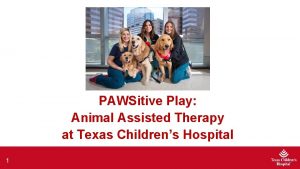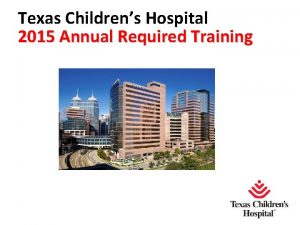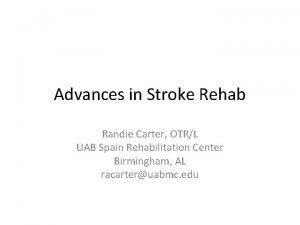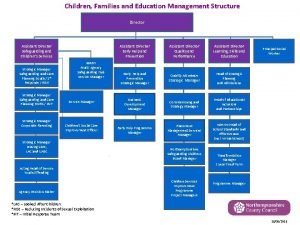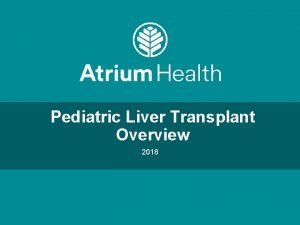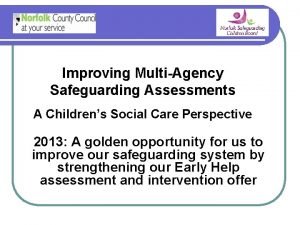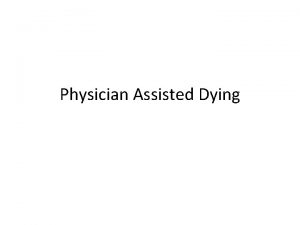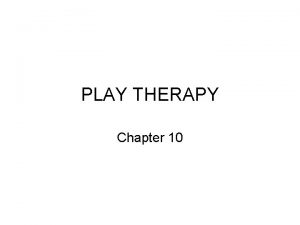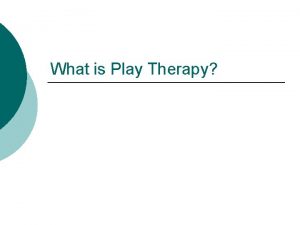PAWSitive Play Animal Assisted Therapy at Texas Childrens











- Slides: 11

PAWSitive Play: Animal Assisted Therapy at Texas Children’s Hospital 1

Meet Elsa! • 1 st Facility Dog that started our program • Born on February 25 th • “Frozen” Liter • Works with Hem/Onc, Palliative, and Renal patients 2

Meet Bailey! • 2 nd Facility Dog to join our program • Born on June 22 nd • “Finding Dory” liter • Works in Legacy Tower with ICU and Cardiology patients • Obsessed with Peanut Butter • Loves all toys that squeak 3

Meet Pinto! • 3 rd Facility Dog to join our program • Born on November 5 th • “Legume” liter • Works with Acute Care, Inpatient Rehab, and Emergency Center 4

Where do the facility dogs come from? 5 • Canine Assistants is a non-profit in Atlanta, GA that has matched over 1, 500 service dogs (individual + facility placements) • Partnership with organization for the life of the dog (continuous support, training assistance, site visits, etc. ) • Matching is tailored to specific hospital environment after site visit as well as patient population

Canine Assistants - Training 6 • Golden Retrievers, Labrador Retrievers, and Golden/Lab mixes are bred, raised, and trained on-site at “the farm” in Atlanta until they graduate and are matched (1. 5 – 2 years old) • All dogs are trained as service dogs to start • Facility dogs are identified during training based on personality • All facility dogs do on-site training at the Children’s Hospital of Atlanta to become accustomed to sights, sounds, and smells of hospitals

Evidence-Based Benefits of Animal Assisted Therapy • Increased: emotional well-being, happiness, calm, relaxation, healing, adjustment to hospital environment, self-confidence etc. • Decreased: anxiety, perception of pain, fear, isolation, etc • Therapy Dogs remind children of home and personal pets, act as a non-judgmental and unconditionally-loving companion, create a calming environment and provide distraction • Therapeutic benefits for families and staff 7

How Animal Assisted Therapy Works • Facility Dog Handlers: Certified Child Life Specialists • Background education in Family and Child Development • 3 -5 years experience working with hospitalized children • Trained to address coping concerns and provide psychosocial and emotional support in a developmentally appropriate way • Utilizes facility dog as a tool to provide goal-oriented therapeutic interventions • Full- time presence of dog allows for: 8 • Increased flexibility and capacity to meet requests • Ability to do planned interventions and follow-up visits • Consistency for returning patients • More opportunities for engagement with families and staff

What Elsa, Bailey & Pinto Do Every Day • Provide emotional support • Collaborate with Physical, Occupational & Speech therapy to encourage mobility and participation • Normalize the environment • Endorse eating according to treatment plans • Supportive presence during procedures • Promote a sense of community • PLAY! 9

Our dogs even provide STAFF SUPPORT! When staff feel emotionally supported they are able to provide the best care to our patients and families 10

11
 Texas children's pawsitive play
Texas children's pawsitive play Texas childrens moli
Texas childrens moli Chapter 27 nutritional therapy and assisted feeding
Chapter 27 nutritional therapy and assisted feeding Both psychoanalysis and humanistic therapy stress
Both psychoanalysis and humanistic therapy stress Bioness integrated therapy system price
Bioness integrated therapy system price Humanistic therapies aim to boost
Humanistic therapies aim to boost The christian childrens fund
The christian childrens fund Childrens services
Childrens services Childrens services walsall
Childrens services walsall Levine childrens
Levine childrens 23 april international children's day turkey
23 april international children's day turkey Multi agency assessment
Multi agency assessment
